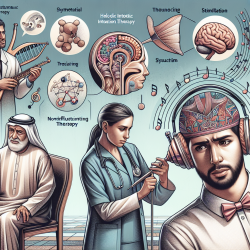The importance of regular and evidence-based assessment practices in speech-language pathology cannot be overstated, especially for children who are deaf or hard of hearing. Implementing effective assessment protocols is crucial for monitoring spoken language outcomes and ensuring these children receive the support they need to thrive. In this blog, we will discuss how an online learning module was developed and evaluated to improve speech-language pathologists' (S-LPs) perceptions and understanding of outcome monitoring procedures in Ontario’s Infant Hearing Program (IHP).
Background
The IHP provides family-centered Early Hearing Detection and Intervention services. This program supports families through universal newborn hearing screening, monitoring of babies at risk for hearing loss, audiological assessments, provision of amplification technologies, and language development services. S-LPs in this program are required to conduct regular assessments to monitor spoken language outcomes in children who are deaf or hard of hearing.
Challenges and the Need for Change
S-LPs reported concerns regarding the outcome monitoring program, including a lack of understanding of its necessity, the perceived loss of intervention time, and the validity of the tools used, such as the Preschool Language Scales (PLS). These challenges led to inconsistent application and data submission.
Collaborative Review and Recommendations
To address these concerns, our research team conducted a comprehensive literature review to identify the best tools for measuring spoken language outcomes. The PLS-5 was identified as the most suitable tool due to its psychometric properties and age range coverage. Additionally, the MacArthur-Bates Communicative Development Inventories (MBCDI) was recommended for children up to 18 months of age.
Developing the Online Learning Module
Using principles of integrated knowledge translation and the Ottawa Model of Research Use, we collaborated with policy makers, managers, and S-LPs to develop an online learning module. This module aimed to provide S-LPs with the knowledge and skills required to implement the new assessment procedures effectively.
Implementation and Evaluation
The online learning module was designed to be accessible and practical for S-LPs. It included an executive summary, a recorded webinar, implementation materials, and optional readings. A pre-post study was conducted with 56 S-LPs who completed surveys before and after the module to assess changes in perceptions and understanding.
Results
After completing the module, S-LPs reported improved perceptions about the outcome monitoring process, better understanding of the procedures, and intentions to implement them in practice. The materials were rated as highly valuable, indicating the effectiveness of the online learning module in translating evidence-based assessment procedures.
Conclusion
Our findings demonstrate that online learning modules can effectively support the implementation of evidence-based assessment procedures in speech-language pathology. By using theory and collaborating with stakeholders, we can develop interventions that enhance clinical practice and ultimately improve outcomes for children who are deaf or hard of hearing.
To read the original research paper, please follow this link: Canadian Journal of Speech-Language Pathology & Audiology










